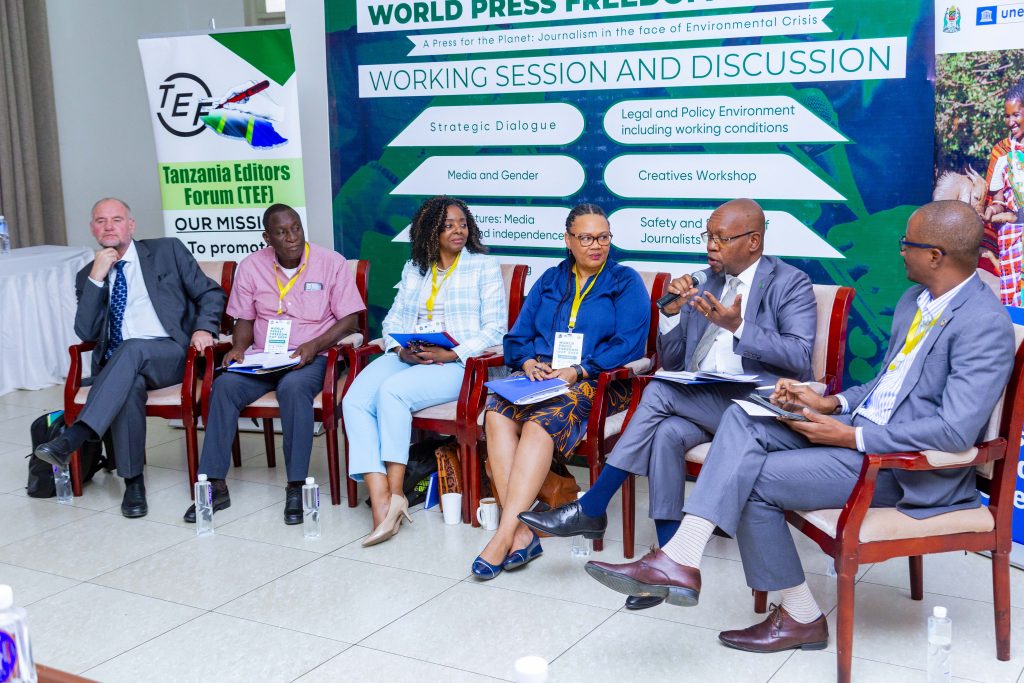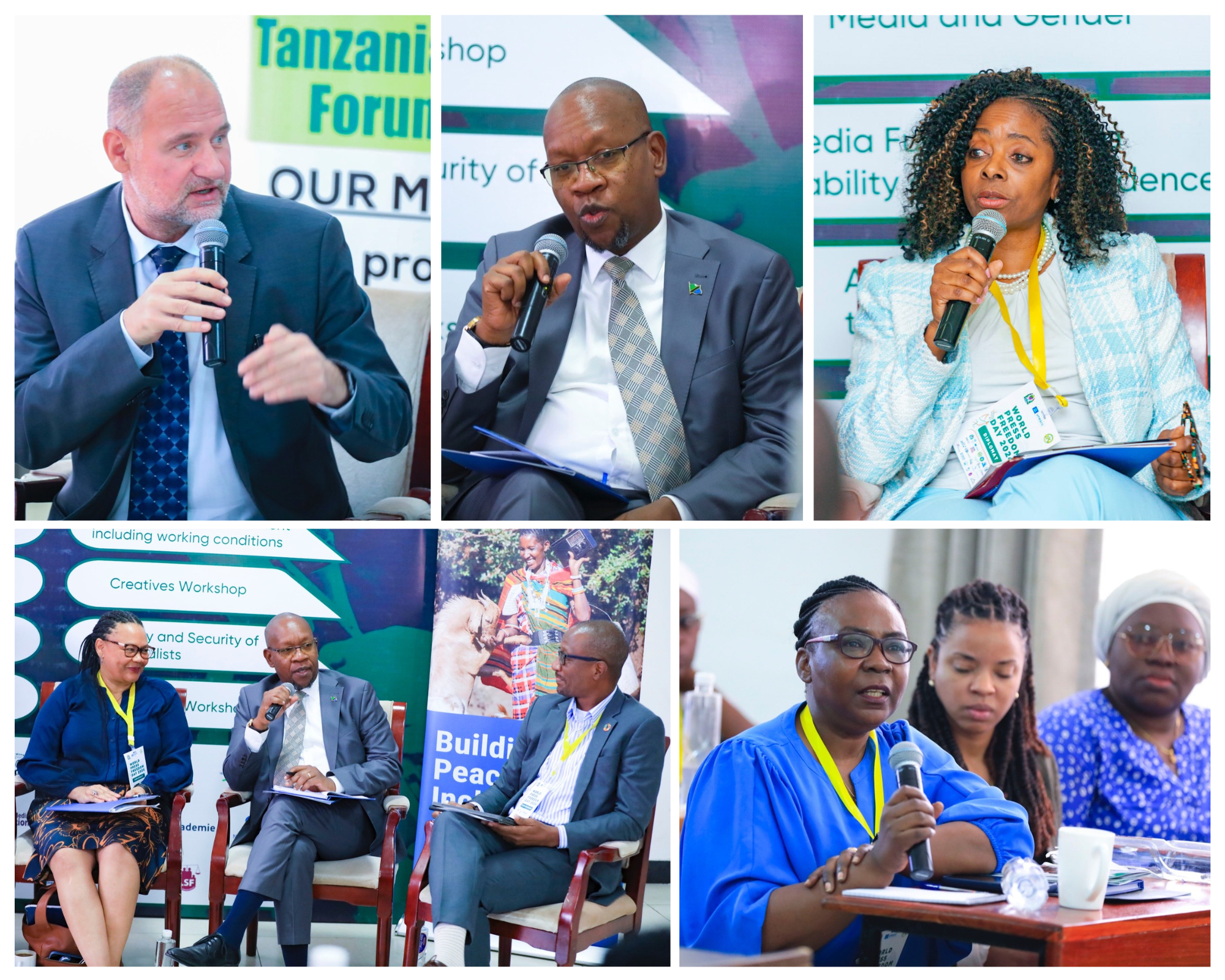Celebrating World Press Freedom Day – Strategic Dialogue on Journalism for Development
On May 3, 2024, Tanzania commemorated World Press Freedom Day at the Jakaya Kikwete Convention Centre in Dodoma joining the rest of the world in celebrating the role of Media. One of the strategic discussions was “Strategic Dialogue: Journalism for Development”. Tech & Media Convergency (TMC), in collaboration with the United Nations Educational, Scientific and Cultural Organization (UNESCO) and the Editors Forum, co-organized this dialogue, which addressed pivotal questions regarding the role of journalism in fostering development, transparency, and accountability.
The main objective of the panel session was to explore the pivotal role of journalism in fostering democracy, ensuring political accountability, and driving sustainable development on a global scale, and provide actionable insights on how to meaningfully invest in public interest journalism.

Government Strategies in Addressing Misinformation
The Chief Government Spokesman, Hon. Mobhare Mantinyi, tackled the issue of misinformation, emphasizing the government’s commitment to transparency and openness. As the Registrar of Newspapers and Director of Information Services, Mantinyi highlighted the role of the Tanzania Communications Regulatory Authority (TCRA) in regulating media. He shared referring to the Media Service Act (2016) and the Access to Information Act, which provide a legal framework for media regulation and public access to information. Mantinyi stated, “The government can either talk to the public through media houses or directly via social media accounts, ensuring the dissemination of accurate information.” He stated that this approach helps mitigate misinformation by providing reliable and transparent communication channels.
Balancing Strategic Communication and Media Transparency
In response to balancing government communication and media transparency, Mantinyi revealed the upcoming National Government Communication Strategy. This strategy aims to ensure the government observes transparency and accountability, allowing both professional journalists and the general public to access information. He stressed the importance of distinguishing between individual misconduct and government actions, ensuring accountability without generalizing misbehavior. “We may have someone in the government misbehaving, but we cannot say this is the government misbehaving,” Mantinyi explained, emphasizing the government’s commitment to disciplinary actions against individual wrongdoers.
Media’s Role in Sustainable Development Goals (SDGs)
Mr. Zlatan Milisic,, the Resident Coordinator of the United Nations in Tanzania, addressed the media’s role in promoting the SDG agenda. He acknowledged the media’s positive influence but highlighted the global lag in achieving these goals. Zlatan emphasized the need for journalists to simplify complex data, making it accessible to the public to foster understanding and action on issues like climate change.
He also praised Tanzania’s efforts in climate action stating that, “I am happy for the Tanzanian government, and its people. Tanzania is doing better on climate action than many countries and is considered to be one of those progressing quite well – this includes responsible production and consumption, it was highlighted in last year’s SDG report by the UN Sustainable Development Solutions Network (SDSN).” However, he emphasized that more work is needed to address recent climate-related challenges, such as floods.
Journalism and Democratic Governance
Ms. Kemi Williams, Development Director at the United Kingdom Embassy, discussed journalism’s critical role in democratic governance and social well-being. She stressed that media freedom is essential for a functioning democracy and the foundation for prosperity and social well-being, contributing to SDG 16 (peaceful and inclusive societies). Williams highlighted the increasing threats faced by journalists, particularly women, who are targeted with online hate speech. She called for global efforts to safeguard press freedom and protect journalists, linking it to a vibrant civil society and governmental accountability. “We need to see government representatives being able to speak to international media houses, defending their positions, and being held to account transparently,” Williams stated.
Supporting Public Interest Journalism
Mr. Theophil Makunga a Media Guru in Tanzania, encouraged journalists to adapt to technological changes while maintaining their commitment to providing accurate information. He emphasized the evolution from traditional media to digital platforms and urged journalists to continue using social media to engage with the public. Makunga advocated for ongoing research to understand public needs, ensuring media content remains relevant and impactful. “If we don’t do research in our media houses and pretend to do the same as we did a few years ago, we are going to fail,” he warned, stressing the importance of regular content research.
This analysis showcases the critical role of adaptability in journalism. As technology evolves, so too must the methods of news dissemination. By embracing digital platforms and continuously researching audience needs, media houses can stay relevant and effective. Makunga’s insights highlight the necessity of not only keeping pace with technological advancements but also prioritizing the accuracy and relevance of information in an ever-changing media landscape.
Implementing the Concept of a Fire Wall
Prof. Jennifer Thomas, at the Howard University in the United States – on discussing the “fire wall” concept, Prof. Thomas explained its importance in maintaining editorial independence from business interests. She explained how in the US, the fire wall ensures that the business side of a media organization does not interfere with news reporting. For example, if CNN reports on a car manufacturer with significant shares in the company, the business side cannot influence the news coverage. She further emphasized the need for clear boundaries between business and editorial functions, especially in government-owned media outlets, to ensure unbiased reporting. “It’s important to have those delineations regardless of who is paying the bills, so you are free to tell those stories, even if it involves investigating the organization,” she asserted.
Prof. Thomas also highlighted the significance of journalism education in promoting ethical standards. She emphasized the foundational principles of journalism—fairness, accuracy, clarity, truthfulness, and transparency. Thomas emphasized the need for journalism professors to instill these values in students, ensuring future journalists uphold high ethical standards. She shared her experience and motivation for becoming a journalist, describing journalists as “defenders of democracy, freedom fighters of the 1st amendment, and sophisticated storytellers.” Thomas called for a return to the basics of journalism, focusing on factual, fair, and transparent reporting.

A way forward
This dialogue was highly informative, offering valuable insights and eye-opening information for media stakeholders and society at large. The discussions underscored the importance of ongoing dialogue in adapting to the rapid advancements in technology and their implications for media and journalism. It was clearly stated that such conversations need to be held more frequently to ensure that all key media actors and stakeholders remain current with global and local developments in the media landscape. An approach shared to significantly enhance relevance, accuracy, and effectiveness of journalism in an ever-evolving technological environment.

